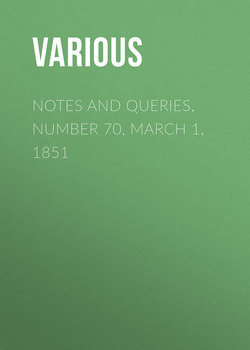Читать книгу Notes and Queries, Number 70, March 1, 1851 - Various - Страница 4
Notes
"LOVE'S LABOUR'S LOST (Act II. Scene 1.)
Оглавление"It is odd that Shakspeare should make Dumain inquire after Rosaline, who was the mistress of Biron, and neglect Katharine, who was his own. Biron behaves in the same manner.—Perhaps all the ladies wore masks.—Steevens.
"They certainly did."—Malone.
"And what if they did?"—Query.
In what possible way can the circumstance of the ladies wearing masks lessen the inconsistency pointed out by Steevens?
Rosaline has been immediately singled out by her former admirer—
"Did I not dance with you in Brabant once?"
—a circumstance quite inconsistent with uncertain identity afterwards.
But if the gentlemen really did mistake the identity of their ladies, Boyet's answers must have misled them into a similar mistake in their names: so that the natural consequence would have been, that each lover would afterwards address his poetical effusion nominally to the wrong lady! which does not appear to have been the case.
Therefore, even if the masking be admitted, it can in no way lessen the inconsistency of the cross questions, which to me appears to have arisen from a most palpable instance of clerical or typographical transposition.
Steevens was on the right scent, although he rejected it in the same breath, when he said,—
"No advantage would be gained by an exchange of names, because the last speech is determined to Biron by Maria, who gives a character of him after he has made his exit."
This is a good reason against a transposition in the male names, but it is none whatever against the same occurrence in the ladies' names; and consequently it is there that the true solution of the difficulty must be sought.
If we admit that a substitution may have occurred, of "Rosaline" for "Katharine," in Boyet's answer to Dumain, and vice versâ in his answer to Biron, all difficulty disappears at once.
The completeness with which the idea of transposition not only accounts for the existence of the error, but at the same time suggests the manner in which it may be corrected, ought of itself to secure its reception, even if it were not corroborated in a very singular way by the following collateral circumstance.
It may be observed that Boyet points out two of the ladies, not only by name, but also by styling them "heirs;" one of Falconbridge, the other of Alençon. Now in their previous descriptions of their respective lovers, one of the ladies (Maria) says she had met Longaville at a marriage of a "Falconbridge;" another lady (Katharine) says she had met Dumain at "Duke Alençon's." When, therefore, we find that Boyet, in reply to Longaville's question, designates Maria as "heir of Falconbridge," it is in direct analogy that he should, in answer to Dumain's question, designate Katharine as "heir of Alençon;" but, in consequence of the transposition of names, Boyet appears, as the text now stands, to confer that designation, not upon Katharine, but upon Rosaline, whom Biron had met at Brabant!
There can be no doubt, therefore, that the names of Katharine and Rosaline have been transposed contrary to the author's intention, and the only wonder is—not that such a very commonplace error should have been committed—but that it should have been suffered to remain through so many editions up to the present time.
A. G. B.
Leeds, Feb. 10. 1851.
